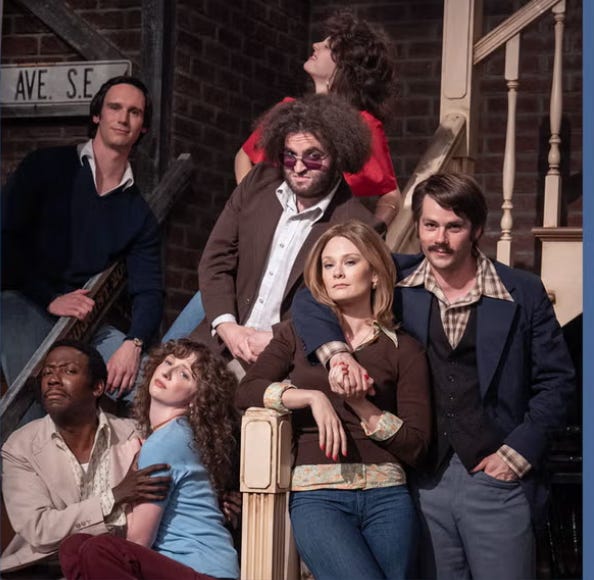Feminista Is Watching This So You Don't Have To: Saturday Night
By Michelle B. Taylor
I’m a huge fan of sketch comedy and variety shows, and Saturday Night Live ranks high for me, alongside Keenan Ivory Wayans’ In Living Color and The Carol Burnett Show. I’ve been watching SNL faithfully for decades, and stuck with it through some of its lowest points of flavorless nonsense and disjointed casting because I was always confident the show would eventually find its groove again.
Saturday Night, a new film directed by Jason Reitman (Juno, Thank You For Smoking), takes us back to October 11, 1975, when it all began. This film is timely, as SNL is celebrating its 50th season and there is a lot of buzz around that epic milestone. The story follows Lorne Michaels, delightfully played by Gabrielle LaBelle, a 21-year-old rising star who should be on your “Ones to Watch” list. He captures Michaels’ fastidiousness and commitment to his stars, each of whom comes to the project from different walks of life. The plot takes us back to about two hours before the show is set to go live and the lineup isn’t even determined yet. They have too many sketches and guest appearances because they’re trying to debut with a bang. Michaels is frantically trying to figure out the final run-of-show, secure his actors and have them rehearse the sketches, and convince corporate bigwigs that the show is both ready and good enough to go live instead of pivoting to their backup plan: rerunning an episode of Johnny Carson’s Tonight Show.
Reitman’s eye pulls us into the frenetic energy behind the scenes and we can’t help but experience the tensions rising. Though we know the show did indeed air, we’re still invited to follow along as if we’re not quite sure whether they can pull this off. Throughout the film’s two hours, we encounter some of our favorite comics who were all on board for the first season. One of the best things about the film is that the actors who play the original ensemble are relatively lesser-known and perfectly cast. They provide more insight into who SNL’s original cast members were as people at that moment in their respective careers.
Chevy Chase, for example, was the first season’s breakout star and received most of the buzz. Cory Michael Smith’s portrayal reminds us that Chase was once a bit of a sex symbol (if not an all-out divo), not just the goofball physical actor we came to love as part of the National Lampoon Vacation franchise. Add Smith to the watch list too, because he is captivating in every scene he’s in and brings Chase to life in ways I didn’t expect.
John Belushi was the show’s loose-cannon impressions guy, and Matt Wood completely transformed into him. It’s one of the best celebrity depictions I’ve seen. At first, I thought it was Jack Black playing Belushi, which would be cool except Black is a bit old for this role (Matt Wood could totally play Black in another biopic--wink wink). Once I realized Wood was playing Belushi, I wanted to find everything he’s been in—he was just that good. Belushi and Gilda Radner (played by Ella Hunt) were easily the most recognized characters but, given how few women were on the show, it wasn’t that hard to identify her. Radner had such a unique quirky personality it’s clear Hunt did her research because she completely embodies her. J.K. Simmons also shines as Milton Berle, the still-performing yet aging star whose light is beginning to dim.
I could go on and on about how stellar this casting is. Jon Batiste, who does the music for the film, charismatically plays the legendary singer-songwriter Billy Preston, and Emmy-winner Lamorne Morris brings new life to the first African American cast member, Garrett Morris (no relation). One actor, Nicholas Braun, even plays two characters (Jim Henson and Andy Kaufmann) after another actor dropped out of the project. Everyone understands the assignment and is on point in their executions.
The cinematography is dizzying at times, but that’s the point. This was an incredibly high-tension, fast-paced, scatter-brained night and until the very last minute, no one was certain they would succeed. Belushi disappeared. The lighting rigs were destroyed. Costume changes weren’t happening fast enough. It was the epitome of creative confusion, which we ultimately come to understand is what makes Saturday Night Live the show it is. The "Not Ready for Prime Time Players," as they were called, brought new life to sketch comedy by satirizing everything from politics to the film industry, responding to the rapid changes in society (e.g. women’s liberation and civil rights), and offering a late-night reprieve to those of us struggling to navigate what emerged as a new normal for the average American.
If you’re into behind-the-scenes stories like these, especially if you’re a fan of the early days of SNL, go check out this film. I’m hoping someone takes this idea and gives us more movies about the debuts of other classic shows like The Cosby Show or All In The Family because the film & TV nerd in me would go to see every single one.



